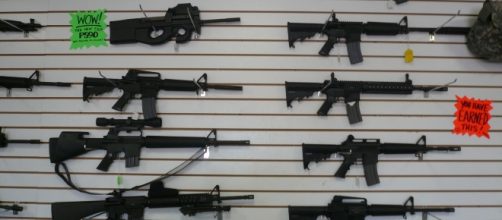Stephen Paddock, the 64-year-old man who rained death down upon an unsuspecting crowd of concert-goers from the smashed out window of his 32nd-floor Mandalay Bay Resort and Casino suite, has the grim distinction of being responsible for the deadliest mass shooting in U.S. history, killing at least 58 people and wounding over 500. Paddock's senseless assault surpasses even the horrific Orlando nightclub shooting that left 49 dead in June 2016. As the night faded, the sounds of gunfire ceased and those wounded fought for their lives as police and rescue workers desperately tried to assess the carnage.
The day broke upon the grisly field where so many Americans had lost their lives, and another fight was rekindled, the fight over Gun Laws. This debate is hardly a new one but is understandably and predictably renewed when unspeakable acts such as the Las Vegas and Orlando shootings occur. Many Americans call for stricter background checks and restrictions on the type of weapons citizens are allowed to own, while others argue that any restrictions are an affront to the U.S. Constitution's second amendment.
At a time when unity is important, the gun control debates divide us
Every time I see that a shooting has occurred, the first thing I ask myself is "why?" The unspeakable tragedy, the senseless loss of life, and the heartbreak felt by those who have lost a loved one simply can't be rationalized.
Former First Lady and presidential candidate, Hillary Clinton tweeted just hours after the attack, "Our grief isn't enough. We can and must put politics aside, stand up to the NRA, and work together to try to stop this from happening again." Clinton received significant backlash over the tweet, suggesting that it was too soon after the attack to start political posturing, or that imploring Americans to put politics aside but stand up to the NRA, a major political contributor to the GOP, was a direct contradiction. Regardless of your own personal beliefs on Gun Rights, it's easy to see why a public figure like Clinton making a political statement could spark outrage and add coal to an already fiery topic that serves to divide America further.
Is gun control the answer?
Americans are divided over gun rights and are equally passionate on either side of the argument. A report by the Houston Chronicle asks, "What else is it but a psychic sickness when an individual finds every excuse imaginable to rationalize mass possession of machines designed solely for the purpose of ending life with bloody, gruesome finality?" I can't help but think that a great many Americans would argue that labeling guns as such are inaccurate and inflammatory since the vast majority of gun owners are average, law-abiding citizens.
Many Americans who are in favor of stricter gun laws or an outright firearms buyback or ban cite Australia as a champion for such a movement, but according to Leah Libresco in her article for the Washington Post, "Mass shootings were too rare in Australia for their absence after the buyback program to be clear evidence of progress." Libresco goes on to write, "Two-thirds of gun deaths every year in the United States are suicides." I'm not suggesting that any gun-related deaths are acceptable, but there seems to be little we can do to improve that statistic with stricter gun laws.
Whatever your views are, it's important to remember that this debate is about human lives, those lost and those who still remain to carry their own flag for the cause in which they believe. If we choose to listen to each other instead of turn to defensiveness and anger, we might find ourselves further ahead in the Gun Control debate.


